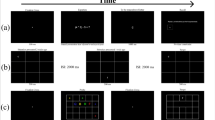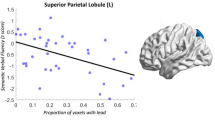Abstract
Cognitive and functional neural correlates of human immunodeficiency virus (HIV) are only partially understood at present. Variability in neural response, which has been noted in the literature, may relate to clinical factors associated with HIV, including time since HIV diagnosis, CD4 count and nadir, HIV viral load, and comorbid infectious processes, especially hepatitis C. The present investigation evaluated working memory-related functional neural activation in 26 HIV+ participants, 28 demographically matched HIV-seronegative individuals, and 8 HIV+ individuals with hepatitis C coinfection. Analyses examined impact of HIV infection duration, CD4 count and nadir, HIV viral load, and hepatitis C serostatus. Results showed that HIV-seronegative participants had fastest reaction times, and during the working memory task, HIV+ participants with hepatitis C coinfection showed strongest bias toward commission errors; however, signal detection (i.e., overall task performance) was equivalent across groups. Functional magnetic resonance imaging (fMRI) results showed HIV-related greater activation to an easier vigilance task and HIV-related lower activation to a more difficult working memory task, consistent with reduced cognitive reserve. Hepatitis C coinfection related to diffuse neural dysregulation. Correlational analyses suggested relationships of increasingly severe disease with poorer functioning in brain regions linked to error monitoring and attention regulation.

Similar content being viewed by others
Notes
Participants who met substance dependence criteria at later time points (i.e., 12 or 24-month visits) were not excluded from participation. For time points most proximal to participant MRI scan, 44 % of individuals qualified for lifetime diagnosis of alcohol dependence (3 % proximal to MRI; no significant differences between clinical groups). Lifetime cocaine dependence was met in 42 % of participants (5 % proximal to MRI). Kruskall-Wallis tests showed significant group differences for endorsement of lifetime (χ 2 = 10.143, p = 0.006) and MRI proximal cocaine dependence (χ 2 = 8.345; p = 0.015; highest rates in HIV/HCV coinfected participants). Lifetime narcotic dependence was met in 15 % of participants (2 % proximal to MRI), with significant differences among clinical groups for lifetime (χ 2 = 22.463, p < 0.001; highest rates in HIV/HCV coinfected participants) but not MRI proximal dependence.
References
Ances BM, Roc AC, Korczykowski M et al (2008) Combination antiretroviral therapy modulates the blood oxygen level-dependent amplitude in human immunodeficiency virus-seropositive patients. J Neurovirol 14:418–424. doi:10.1080/13550280802298112
Ances B, Vaida F, Ellis R, Buxton R (2011) Test-retest stability of calibrated BOLD-fMRI in HIV- and HIV+ subjects. NeuroImage 54:2156–2162. doi:10.1016/j.neuroimage.2010.09.081
Ances BM, Ortega M, Vaida F, et al (2012) Independent effects of HIV, aging, and HAART on brain volumetric measures. J Acquir Immune Defic Syndr 1999 59:469–477. doi:10.1097/QAI.0b013e318249db17
Andersson J, Smith SM (2007) Non-linear optimisation. FMRIB technical report TR07JA1. Oxford
Andersson J, Jenkinson M, Smith SM (2007) Non-linear registration, aka Spatial normalisation. FMRIB technical report TR07JA2. Oxford
Becker JT, Sanders J, Madsen SK et al (2011) Subcortical brain atrophy persists even in HAART-regulated HIV disease. Brain Imaging Behav 5:77–85. doi:10.1007/s11682-011-9113-8
Becker JT, Maruca V, Kingsley LA et al (2012) Factors affecting brain structure in men with HIV disease in the post-HAART era. Neuroradiology 54:113–121. doi:10.1007/s00234-011-0854-2
Bullmore ET, Suckling J, Overmeyer S et al (1999) Global, voxel, and cluster tests, by theory and permutation, for a difference between two groups of structural MR images of the brain. IEEE Trans Med Imaging 18:32–42
Burdo TH, Soulas C, Orzechowski K et al (2010) Increased monocyte turnover from bone marrow correlates with severity of SIV encephalitis and CD163 levels in plasma. PLoS Pathog 6:e1000842. doi:10.1371/journal.ppat.1000842
Chang L, Speck O, Miller EN et al (2001) Neural correlates of attention and working memory deficits in HIV patients. Neurology 57:1001–1007
Chang L, Tomasi D, Yakupov R et al (2004) Adaptation of the attention network in human immunodeficiency virus brain injury. Ann Neurol 56:259–272. doi:10.1002/ana.20190
Chang L, Yakupov R, Nakama H et al (2008) Antiretroviral treatment is associated with increased attentional load-dependent brain activation in HIV patients. J Neuroimmune Pharmacol Off J Soc NeuroImmune Pharmacol 3:95–104. doi:10.1007/s11481-007-9092-0
Chang L, Holt JL, Yakupov R et al (2013) Lower cognitive reserve in the aging human immunodeficiency virus-infected brain. Neurobiol Aging 34:1240–1253. doi:10.1016/j.neurobiolaging.2012.10.012
Clark US, Cohen RA (2010) Brain dysfunction in the era of combination antiretroviral therapy: implications for the treatment of the aging population of HIV-infected individuals. Curr Opin Investig Drugs 2000 11:884–900
Cohen RA, Harezlak J, Gongvatana A et al (2010a) Cerebral metabolite abnormalities in human immunodeficiency virus are associated with cortical and subcortical volumes. J Neurovirol 16:435–444. doi:10.3109/13550284.2010.520817
Cohen RA, Harezlak J, Schifitto G et al (2010b) Effects of nadir CD4 count and duration of HIV infection on brain volumes in the HAART era. J Neurovirol 16:25–32. doi:10.3109/13550280903552420
Cohen RA, de la Monte S, Gongvatana A et al (2011) Plasma cytokine concentrations associated with HIV/hepatitis C coinfection are related to attention, executive and psychomotor functioning. J Neuroimmunol 233:204–210. doi:10.1016/j.jneuroim.2010.11.006
Crum-Cianflone NF, Moore DJ, Letendre S et al (2013) Low prevalence of neurocognitive impairment in early diagnosed and managed HIV-infected persons. Neurology 80:371–379. doi:10.1212/WNL.0b013e31827f0776
Devlin KN, Gongvatana A, Clark US et al (2012) Neurocognitive effects of HIV, hepatitis C, and substance use history. J Int Neuropsychol Soc JINS 18:68–78. doi:10.1017/S1355617711001408
Ellis RJ, Badiee J, Vaida F et al (2011) CD4 nadir is a predictor of HIV neurocognitive impairment in the era of combination antiretroviral therapy. AIDS Lond Engl 25:1747–1751. doi:10.1097/QAD.0b013e32834a40cd
Ernst T, Chang L, Jovicich J et al (2002) Abnormal brain activation on functional MRI in cognitively asymptomatic HIV patients. Neurology 59:1343–1349
Ernst T, Yakupov R, Nakama H et al (2009) Declined neural efficiency in cognitively stable human immunodeficiency virus patients. Ann Neurol 65:316–325. doi:10.1002/ana.21594
Forton DM, Allsop JM, Main J et al (2001) Evidence for a cerebral effect of the hepatitis C virus. Lancet 358:38–39. doi:10.1016/S0140-6736(00)05270-3
Fox MD, Zhang D, Snyder AZ, Raichle ME (2009) The global signal and observed anticorrelated resting state brain networks. J Neurophysiol 101:3270–3283. doi:10.1152/jn.90777.2008
Garvey LJ, Pavese N, Ramlackhansingh A et al (2012) Acute HCV/HIV coinfection is associated with cognitive dysfunction and cerebral metabolite disturbance, but not increased microglial cell activation. PLoS One 7:e38980. doi:10.1371/journal.pone.0038980
Gongvatana A, Schweinsburg BC, Taylor MJ et al (2009) White matter tract injury and cognitive impairment in human immunodeficiency virus-infected individuals. J Neurovirol 15:187–195. doi:10.1080/13550280902769756
Gongvatana A, Harezlak J, Buchthal S et al (2013) Progressive cerebral injury in the setting of chronic HIV infection and antiretroviral therapy. J Neurovirol. doi:10.1007/s13365-013-0162-1
Gusnard DA, Akbudak E, Shulman GL, Raichle ME (2001) Medial prefrontal cortex and self-referential mental activity: relation to a default mode of brain function. Proc Natl Acad Sci U S A 98:4259–4264. doi:10.1073/pnas.071043098
Hayasaka S, Nichols TE (2004) Combining voxel intensity and cluster extent with permutation test framework. NeuroImage 23:54–63. doi:10.1016/j.neuroimage.2004.04.035
Heaton RK, Clifford DB, Franklin DR Jr et al (2010) HIV-associated neurocognitive disorders persist in the era of potent antiretroviral therapy: CHARTER Study. Neurology 75:2087–2096. doi:10.1212/WNL.0b013e318200d727
Jenkinson M, Smith S (2001) A global optimisation method for robust affine registration of brain images. Med Image Anal 5:143–156
Jenkinson M, Bannister P, Brady M, Smith S (2002) Improved optimization for the robust and accurate linear registration and motion correction of brain images. NeuroImage 17:825–841
Jernigan TL, Archibald SL, Fennema-Notestine C et al (2011) Clinical factors related to brain structure in HIV: the CHARTER study. J Neurovirol 17:248–257. doi:10.1007/s13365-011-0032-7
Joska JA, Gouse H, Paul RH et al (2010) Does highly active antiretroviral therapy improve neurocognitive function? A systematic review. J Neurovirol 16:101–114. doi:10.3109/13550281003682513
Kim AY, Onofrey S, Church DR (2013) An epidemiologic update on hepatitis C infection in persons living with or at risk of HIV infection. J Infect Dis 207:S1–S6. doi:10.1093/infdis/jis927
Letendre SL, Ellis RJ, Everall I et al (2009) Neurologic complications of HIV disease and their treatment. Top HIV Med 17:46–56
Liner KJ 2nd, Ro MJ, Robertson KR (2010) HIV, antiretroviral therapies, and the brain. Curr HIV/AIDS Rep 7:85–91. doi:10.1007/s11904-010-0042-8
Muller-Oehring EM, Schulte T, Rosenbloom MJ et al (2010) Callosal degradation in HIV-1 infection predicts hierarchical perception: a DTI study. Neuropsychologia 48:1133–1143. doi:10.1016/j.neuropsychologia.2009.12.015
Nichols TE, Holmes AP (2002) Nonparametric permutation tests for functional neuroimaging: a primer with examples. Hum Brain Mapp 15:1–25
Oakes TR, Fox AS, Johnstone T et al (2007) Integrating VBM into the General Linear Model with voxelwise anatomical covariates. NeuroImage 34:500–508. doi:10.1016/j.neuroimage.2006.10.007
Owen AM, McMillan KM, Laird AR, Bullmore E (2005) N-back working memory paradigm: a meta-analysis of normative functional neuroimaging studies. Hum Brain Mapp 25:46–59. doi:10.1002/hbm.20131
Penner I-K, Rausch M, Kappos L et al (2003) Analysis of impairment related functional architecture in MS patients during performance of different attention tasks. J Neurol 250:461–472. doi:10.1007/s00415-003-1025-0
Pfefferbaum A, Rosenbloom MJ, Sassoon SA et al (2012) Regional brain structural dysmorphology in human immunodeficiency virus infection: effects of acquired immune deficiency syndrome, alcoholism, and age. Biol Psychiatry 72:361–370. doi:10.1016/j.biopsych.2012.02.018
Ragin AB, Du H, Ochs R et al (2012) Structural brain alterations can be detected early in HIV infection. Neurology 79:2328–2334. doi:10.1212/WNL.0b013e318278b5b4
Raichle ME, MacLeod AM, Snyder AZ et al (2001) A default mode of brain function. Proc Natl Acad Sci U S A 98:676–682. doi:10.1073/pnas.98.2.676
Rempel H, Sun B, Calosing C et al (2013) Monocyte activation in HIV/HCV coinfection correlates with cognitive impairment. PLoS One 8:e55776. doi:10.1371/journal.pone.0055776
Segonne F, Dale AM, Busa E et al (2004) A hybrid approach to the skull stripping problem in MRI. Neuroimage 22:1060–1075
Siemens Corporation (2013) Germany
Simmonds DJ, Fotedar SG, Suskauer SJ et al (2007) Functional brain correlates of response time variability in children. Neuropsychologia 45:2147–2157. doi:10.1016/j.neuropsychologia.2007.01.013
Snodgrass JG, Corwin J (1988) Pragmatics of measuring recognition memory: applications to dementia and amnesia. J Exp Psychol Gen 117:34–50
Sun B, Abadjian L, Rempel H et al (2013) Differential cognitive impairment in HCV coinfected men with controlled HIV compared to HCV monoinfection. J Acquir Immune Defic Syndr 62:190–196. doi:10.1097/QAI.0b013e31827b61f1
Sun B, Abadjian L, Rempel H et al (2010) Peripheral biomarkers do not correlate with cognitive impairment in highly active antiretroviral therapy-treated subjects with human immunodeficiency virus type 1 infection. J Neurovirol 16:115–124. doi:10.3109/13550280903559789
Sweet LH, Rao SM, Primeau M et al (2006) Functional magnetic resonance imaging response to increased verbal working memory demands among patients with multiple sclerosis. Hum Brain Mapp 27:28–36. doi:10.1002/hbm.20163
Taylor MJ, Letendre SL, Schweinsburg BC et al (2004) Hepatitis C virus infection is associated with reduced white matter N-acetylaspartate in abstinent methamphetamine users. J Int Neuropsychol Soc 10:110–113. doi:10.1017/S1355617704101161
Thompson PM, Dutton RA, Hayashi KM et al (2005) Thinning of the cerebral cortex visualized in HIV/AIDS reflects CD4+ T lymphocyte decline. Proc Natl Acad Sci U S A 102:15647–15652. doi:10.1073/pnas.0502548102
Tomasi D, Chang L, de Castro Caparelli E et al (2006) The human immunodeficiency virus reduces network capacity: acoustic noise effect. Ann Neurol 59:419–423. doi:10.1002/ana.20766
Towgood KJ, Pitkanen M, Kulasegaram R et al (2012) Mapping the brain in younger and older asymptomatic HIV-1 men: frontal volume changes in the absence of other cortical or diffusion tensor abnormalities. Cortex J Devoted Study Nerv Syst Behav 48:230–241. doi:10.1016/j.cortex.2011.03.006
Valcour VG, Shiramizu BT, Shikuma CM (2010) HIV DNA in circulating monocytes as a mechanism to dementia and other HIV complications. J Leukoc Biol 87:621–626. doi:10.1189/jlb.0809571
Wendelken LA, Valcour V (2012) Impact of HIV and aging on neuropsychological function. J Neurovirol 18:256–263. doi:10.1007/s13365-012-0094-1
Winston A, Garvey L, Scotney E et al (2010) Does acute hepatitis C infection affect the central nervous system in HIV-1 infected individuals? J Viral Hepat 17:419–426. doi:10.1111/j.1365-2893.2009.01198.x
Acknowledgments
Support for this project came from NIH R01MH074368, 403 P01AA019072, K99AA020235, and P30AI042853 (Lifespan/Tufts/404 Brown Center for AIDS Research). Many thanks to the current and past students, fellows, and staff of the Cohen and Tashima laboratories, especially Kate Devlin, Skye Ross, Matthew Pinna, and Anna Folkers.
Conflict of interest
The following authors declare that they have no conflict of interest: Jessica Caldwell, Assawin Gongvatana, Bradford Navia, Lawrence Sweet, Karen Tashima, Mingzhou Ding, and Ronald Cohen.
Author information
Authors and Affiliations
Corresponding authors
Rights and permissions
About this article
Cite this article
Caldwell, J.Z.K., Gongvatana, A., Navia, B.A. et al. Neural dysregulation during a working memory task in human immunodeficiency virus-seropositive and hepatitis C coinfected individuals. J. Neurovirol. 20, 398–411 (2014). https://doi.org/10.1007/s13365-014-0257-3
Received:
Revised:
Accepted:
Published:
Issue Date:
DOI: https://doi.org/10.1007/s13365-014-0257-3




